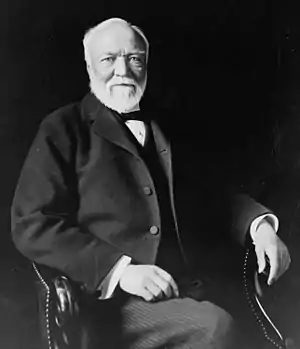Carnegie School
The Carnegie School was a so-called "Freshwater" economics intellectual movement in the 1950s and 1960s based at Carnegie Mellon University and led by Herbert A. Simon, James March, and Richard Cyert.[1][2]
Overview
The focus of the research was on organizational behavior and the application of decision analysis, management science, and psychology as well as theories such as bounded rationality to the understanding of the organization and the firm.
Organizations,[3][4] Administrative Behavior, and A Behavioral Theory of the Firm were three highly influential works done by researchers at the Carnegie School as well as work by Victor Vroom, Oliver E. Williamson and other faculty and graduate students.
The interdisciplinary approach featured faculty at Carnegie Mellon's modern departments of economics, business, public policy, computer science, psychology, statistics and data science, and social and decision sciences.
References
- Raymond Augustine Bauer, Kenneth J. Gergen (1968). The study of policy formation. National Planning Association. p.115.
- Jens Beckert, Milan Zafirovski (2006). International encyclopedia of economic sociology. p.48
- Anderson, Marc H.; Lemken, Russell K. (2019). "An Empirical Assessment of the Influence of March and Simon's Organizations: The Realized Contribution and Unfulfilled Promise of a Masterpiece". Journal of Management Studies. 56 (8): 1537–1569. doi:10.1111/joms.12527. ISSN 1467-6486.
- Wilden, Ralf; Hohberger, Jan; Devinney, Timothy M.; Lumineau, Fabrice (2019). "60 Years of March and Simon's Organizations: An Empirical Examination of its Impact and Influence on Subsequent Research". Journal of Management Studies. 56 (8): 1570–1604. doi:10.1111/joms.12531. ISSN 1467-6486.
External links
 Quotations related to Carnegie School at Wikiquote
Quotations related to Carnegie School at Wikiquote
